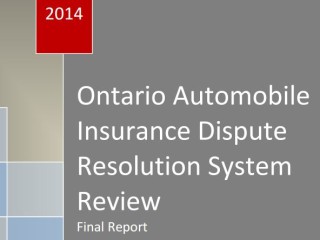In a recent costs decision on a construction law case, Justice Broad considered the principle of proportionality in mixed-success simplified procedure cases.
Background:
The plaintiff was a building contractor, and the defendants were property owners. The defendants contracted the plaintiff to build a home according to specific plans by a residential design company. When the home was complete and the defendants began to occupy the home, the plaintiff claimed it was owed $148,093 for the construction project. The defendants counterclaimed for deficiencies in the construction that required correction and for intimidation and harassment that lead to one of the defendants developing health problems such as high blood pressure.
The action was brought under the simplified procedure.
At trial, the defendants were ordered to pay $44,299.51 to the plaintiff in the main action. The plaintiff (defendant in the counterclaim) was ordered to pay the defendants (plaintiffs in the counterclaim) $88,333 plus interest in the counterclaim. These amounts were to be off-set.
The counterclaim trial decision can be found here.
The Costs Decision
In the face of mixed success for the parties, the court was then tasked with determining costs.
The Defendants’ Position
The defendants (plaintiffs in the counterclaim) sought costs on a substantial indemnity basis in the amount of $109,747. In the alternative, they sought $77,650.95. They argued that they were the ultimately successful party.
The defendants had served an offer to settle dated June 10, 2021, with the following terms:
- The plaintiff shall pay to the defendants the sum of $45,000 plus costs on a partial indemnity basis. This section A of the offer was stated to be open for acceptance until June 30, 2021, and thereafter to automatically expire and be deemed to be withdrawn;
- The plaintiff shall pay to the defendants the sum of $55,000 plus costs on a partial indemnity basis. This section B of the offer was stated to be open for acceptance after June 30, 2021, and until July 31, 2021. After July 31, 2021, the ability to accept this section B was stated to expire and be deemed to be withdrawn.
- The plaintiff shall pay to the defendants the sum of $60,000 plus costs on a substantial indemnity basis. This section C of the offer was stated to be open for acceptance after July 31, 2021, until the commencement of the trial, at which time it shall be deemed to be withdrawn.
The defendants relied on Rooney v. Graham, 2001 CanLII 24064 for the proposition that an escalating offer to settle can be considered a Rule 49 offer for the purpose of determining cost consequences and therefore the court should consider whether their escalating offer was more favourable to the plaintiff than the trial result.
Another factor emphasized by the defendant was the plaintiff’s summary judgement motion, that had no real chance of success and did not proceed. The defendants were still required to prepare responding material for that motion.
The Plaintiff’s Position
The plaintiff (defendant in the counterclaim) argued that costs should be denied entirely, or if awarded, should be significantly less than the amount claimed by the defendants. It relied on Cornerstone Properties Inc. v. Southside Construction Management Limited, 2020 ONCA 280 (C.A.) for the proposition that a claim for costs that equals or exceeds the amount awarded offends the principle of proportionality.
Furthermore, the plaintiff pointed out that success had been divided, and that neither its own offer to settle nor that of the defendant complied with the strict Rule 49 requirements. The plaintiff offered to pay the defendants $500 and to repair the stairs from the garage area to the basement using its own workers and subcontractors, or to pay for a subcontractor to rebuild the stairs in compliance with the Ontario Building Code.
With respect to the abandoned summary judgement motion, the plaintiff said there was nothing wrong with considering an early resolution of the dispute. The motion was reconsidered once the defendants strongly objected to that approach.
Guiding Principles of Costs
Section 131(1) of the Courts of Justice Act, R.S.O. 1990, c. C.43, provides that “subject to the provisions of an Act or the Rules of Civil Procedure the costs of and incidental to a proceeding or a step in a proceeding are in the discretion of the court, and the court may determine by whom and to what extent the cost shall be paid.”
In the exercise of its discretion on costs, the court is to consider the factors set forth in Rule 57.01(1), including the principle of indemnity at para. (0.a) and the amount of costs that an unsuccessful party could reasonably expect to pay at para. (0.b).
The usual rule in civil litigation is that costs follow the event, and that rule should not be departed from except for very good reasons.
Rule 57.01(4) provides that the court has the discretion to award all or part of the costs on a substantial indemnity basis or award costs in an amount that represents full indemnity. While full indemnity and substantial indemnity costs are an exception to the general rule and awarded only under special circumstances, allegations made or conduct by a party that is “reprehensible, scandalous, or outrageous” falls within the ambit of an award of full indemnity costs.
The overall objective in dealing with costs is to fix an amount that is fair and reasonable for the unsuccessful party to pay in the particular circumstances of the case, rather than an amount fixed by the actual costs incurred by the successful party. The expectation of the parties concerning the quantum of costs is a relevant factor to consider. The amount awarded for costs must reflect some proportionality to the actual issues argued, rather than an unquestioned reliance on billable hours and documents created.
The Decision
Justice Broad accepted that the defendants were the more successful party in terms of the quantum of recovery. However, the question of success is more nuanced. Their position was that the construction contract was a “fixed price” contract and that they owed no further amounts to the plaintiff. They were unsuccessful on this position. Moreover, the defendant Ron Vandenhengel’s counterclaim for damages against Ike Keesmaat for harassment and intentional infliction of mental distress, which occupied a significant portion of trial time, was unsuccessful.
The trial was necessitated, in significant measure, by the unwavering positions taken by the defendants that were ultimately not successful.
Though the defendants were the more successful party (in terms of quantum of damages), entitling them to an award for costs, the quantum of the costs’ award was mitigated by the following considerations:
- Neither party’s offer to settle satisfied the requirements of Rule 49 so as to bear on the costs determination. The defendant’s offer expired in advance of the hearing, unlike in Rooney, which was a single offer with an escalating feature.
- There were no exceptional circumstances relating to the plaintiff’s conduct in the litigation itself that would justify elevated costs.
- Simplified Procedure is meant to be a less expensive method of litigation. Costs should be proportional to the issues in dispute. There are limits to the amount of money that can be claimed under Simplified Procedure ($200,000). Rule 76.12.1 limits costs to $50,000 and disbursements to $25,000. Cases started before the introduction of Rule 76.12.1 are not subject to these limits, but the principle of proportionality that this new rule embodies is a relevant consideration when assessing costs. Applying the principle of proportionality and taking into consideration that:
a. The defendants were unsuccessful in some aspects of their counterclaim, most significantly the claims for harassment and intentional infliction of mental distress;
b. The plaintiff was successful in part in the main action;
c. The plaintiff brought a motion for summary judgement that it did not pursue, but the defendants still had to respond to the motion; and
d. The defendants were required to call expert evidence at trial.
Justice Broad ordered the plaintiff to pay the defendants the costs of the proceeding fixed in the sum of $47,382.86.













